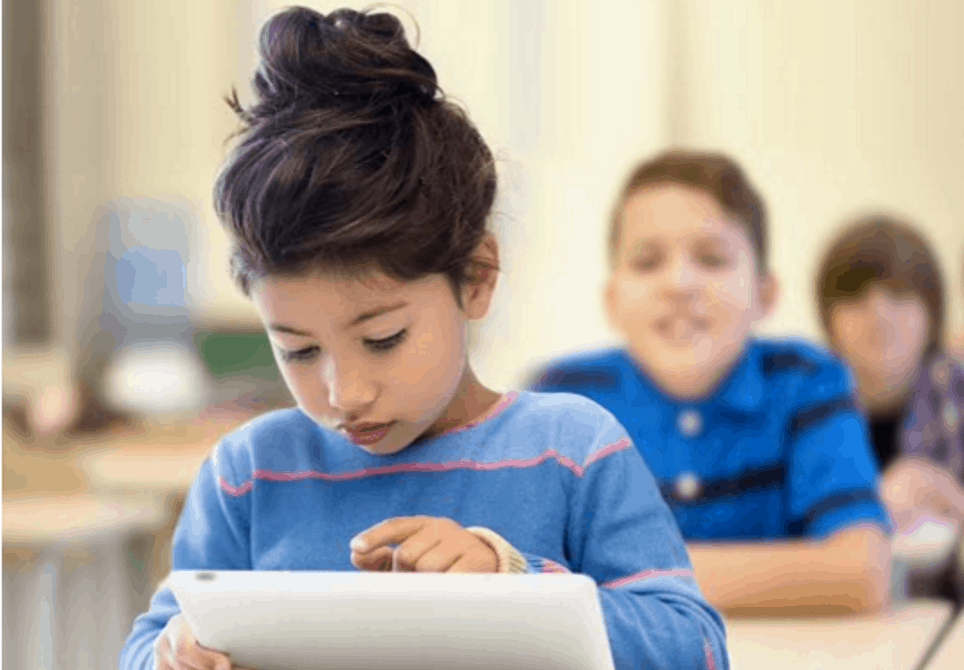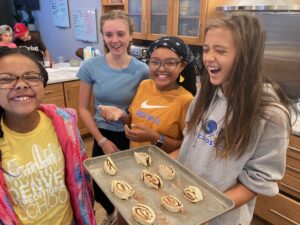Incorporating Tech to Support English Language Learners

By Bill King
English as a Second Language (ESL) teachers in Charlotte Mecklenburg Schools are generating a lot of excitement over how they are transforming learning and changing the culture in their classrooms by integrating technology.
Our ESL teachers have access to various technology resources, but it is the iPad Tray project that is reinvigorating our teachers and students. Last year, after a rigorous application process, 30 ESL teachers were awarded a set of 10 iPads. Our goal was to use this device to create more opportunities for our ESL students to practice English language skills. In order for this to be successful, we knew these teachers would need ongoing and persistent support.
It Is Not the Device That Transforms Learning, It Is How You Use It
This was an initiative that was very intimidating and new to these teachers. Experienced teachers were now novice learners and our newer teachers, who are digital natives, were still learning how to teach. We knew we had to offer ongoing, blended learning opportunities and relentless support.
We began the year with a launch training, which was a combination of classroom procedures, learning new apps and how to incorporate these resources into the curriculum. Throughout the school year, we had required webinars, optional help desk webinar sessions where teachers can get personalized support and school visits from one of our ESL technology resource teachers. To hold teachers accountable, we had required assignments and an iPad Project Showcase, where they presented student projects.
No One Saw This Coming
This project has generated a lot of excitement throughout the district and the state of North Carolina. This cohort of ESL teachers is being recognized as leaders at their schools, in both English language development and instructional technology. Many began presenting resources to their colleagues at the school level. As they became more confident, we were able to spotlight some of these teachers in our district webinars as “Featured Teachers.” We had momentum.
Soon the North Carolina Department of Public Instruction was asking our teachers to lead professional development for ESL teachers across the state. Our teachers have become leaders in instructional technology for English language learners. The recognition did not stop there. Cohort members were being nominated for teacher of the year at their schools. With this success, we were able to expand this initiative by another 30 teachers, known as cohort 2. We now have 60 ESL teachers changing the culture in their classrooms. Our teachers are not the only ones bolstered by the project–our students are too.
Our teachers are creating opportunities for our students to practice English language skills and be included in project-based learning assignments. We have novice English language learners creating eBooks, recording green screen videos, using apps that support close reading strategies and augmenting reality. In some of our schools, ESL students are the ones evaluating apps, not just the teachers. ESL students are demonstrating apps to their classmates, not just the teachers.
The culture change is happening.
How Do We Keep This Going?
Sustainability is always an issue in education when you are starting a new initiative, so it was important that we maintain our momentum. We continued our differentiated support, but we knew supporting 60 cohort members (and over 270 ESL teachers overall) was going to be challenge.
We needed our teachers to take on a leadership role and to collaborate with each other. With our support, teachers began school-based ESL technology professional learning networks (PLN’s). Teachers are now inviting their colleagues to their schools for professional development sessions. Here they can collaborate, share project ideas and learn from each other.
Teachers are networking outside of their schools, discovering new concepts and strategies that will benefit their students. Continuing these PLN’s are essential for this project to remain successful.
Next Steps
The hard work and dedication of these ESL teachers has enabled us to expand this project another 30 teachers. Cohort 3 will begin at the start of next school year! It is important to note that this project is only successful because of the effort of our ESL Technology Resource Team.
Want to learn more about our projects, apps, and teachers? Click on our online magazine to see our project in full detail.
This blog is part of the Supporting English Language Learners Series with support from The Bill & Melinda Gates Foundation. For more, stay tuned for the culminating podcast, infographic and publication.
For more, see:
- Next-Gen Personalized Learning for ELL Students
- Meeting the Needs of English Language Learners in Big LA Schools
- Supporting ELL Students with Automated Writing Feedback
Bill King is an ESL Instructional Technology Specialist at Charlotte Mecklenburg Schools. Follow them on Twitter: @CharMeckSchools.
Stay in-the-know with all things EdTech and innovations in learning by signing up to receive the weekly Smart Update. This post includes mentions of a Getting Smart partner. For a full list of partners, affiliate organizations and all other disclosures please see our Partner page.






0 Comments
Leave a Comment
Your email address will not be published. All fields are required.